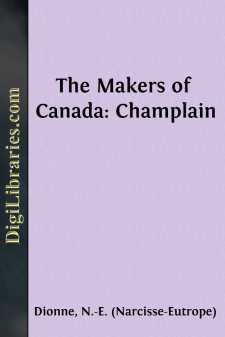History
- Africa 30
- Americas (North Central South West Indies) 50
- Ancient 68
- Asia 58
- Australia & New Zealand 8
- Canada 41
- Caribbean & West Indies 1
- Civilization 20
- Eastern Europe 12
- Europe 310
- Expeditions & Discoveries 60
- General 77
- Historical Geography 1
- Jewish 9
- Latin America 3
- Medieval 8
- Middle East 13
- Military 248
- Revolutionary 8
- Study & Teaching 5
- United States 353
- Western Europe 56
- World 13
History Books
Sort by:
by:
Julia Griffiths
INTRODUCTION. WHAT SOME OF THE BUILDERS HAVE THOUGHT. A word oft-times is expressive of an entire policy. Such is the term Abolition. Though formerly used as a synonym of Anti-Slavery, people now clearly understand that the designs of those who have ranged themselves under the first of these systems of reform are of deeper significance and wider scope than are the objects contemplated by the latter,...
more...
by:
Dr. Henri Blanc
CHAPTER I. The Emperor Theodore—His Rise and Conquests—His Army and Administration—Causes of his Fall—His Personal Appearance and Character—His Household and Private Life. Lij Kassa, better known as the Emperor Theodore, was born in Kouara about the year 1818. His father was a noble of Abyssinia, and his uncle, the celebrated Dejatch Comfou, had for many years governed the provinces of...
more...
PREFACE In introducing the student to the history of the development of European culture, the problem of proportion has seemed to me, throughout, the fundamental one. Consequently I have endeavored not only to state matters truly and clearly but also to bring the narrative into harmony with the most recent conceptions of the relative importance of past events and institutions. It has seemed best, in an...
more...
by:
Filson Young
THE THIRD VOYAGE Columbus was at sea again; firm ground to him, although so treacherous and unstable to most of us; and as he saw the Spanish coast sinking down on the horizon he could shake himself free from his troubles, and feel that once more he was in a situation of which he was master. He first touched at Porto Santo, where, if the story of his residence there be true, there must have been potent...
more...
by:
John McElroy
CLOTHING: ITS RAPID DETERIORATION, AND DEVICES TO REPLENISH IT—DESPERATE EFFORTS TO COVER NAKEDNESS—"LITTLE RED CAP" AND HIS LETTER. Clothing had now become an object of real solicitude to us older prisoners. The veterans of our crowd—the surviving remnant of those captured at Gettysburg—had been prisoners over a year. The next in seniority—the Chickamauga boys—had been in ten...
more...
by:
Jacob Abbott
Taking Passage. When Rollo was about twelve years of age, he made a voyage to Europe under rather extraordinary circumstances. He went alone; that is to say, he had no one to take care of him. In fact, in addition to being obliged to take care of himself, he had also his little sister Jane to take care of; for she went with him. The way it happened that two such children were sent to sea on such a long...
more...
CHAPTER I THE COURTS AND BUILDINGS S t. John's College was founded in 1511, in pursuance of the intentions of the Lady Margaret Beaufort, mother of King Henry VII. Approaching the College from the street we enter by the Great Gate. The gateway with its four towers is the best example of the characteristic Cambridge gate, and dates from the foundation of the College. It is built of red brick (the...
more...
CHAPTER I CHAMPLAIN'S FIRST VOYAGE TO AMERICA Samuel Champlain, the issue of the marriage of Antoine Champlain and Marguerite Le Roy, was born at Brouage, now Hiers Brouage, a small village in the province of Saintonge, France, in the year 1570, or according to the Biographie Saintongeoise in 1567. His parents belonged to the Catholic religion, as their first names would seem to indicate. When...
more...
CHAPTER I ON THE EDGE NEWCASTLE, NATAL, Thursday, October 5, 1899. Late last Sunday night I found myself slowly crawling towards the front from Pretoria in a commandeered train crammed full of armed Boers and their horses. I had rushed from the Cape to quiet little Bloemfontein, the centre of one of the best administered States in the world, where the heads of the nation in the intervals of discussing...
more...
by:
John West
SECTION I [1643.] At the era of discovery by Tasman, Van Diemen's Land was inhabited. He heard, or thought he heard, the voices of people and the sound of a trumpet: he noticed the recently cut notches, five feet asunder, on the bark of the trees, and he saw the smoke of fires. He inferred that they possessed some unusual method of climbing, or that their stature was gigantic. In the sound, the...
more...











